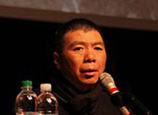Liu Jingxin, who has delivered coal on a tricycle cart for 21 years through the winding alleys of Dongcheng district, is not worried about his future, but perhaps he should be.
Beijingers are turning to electric radiators instead of coal stoves, and local coal factories are gradually shutting down one by one.
To prevent air pollution, the city government has launched a wide-ranging electric-heating reform project.
The goal is to replace all coal heating systems within the Fifth Ring Road by 2015. Traditional coal factories are vanishing.
Liu works for the Liulijing Division of the Beijing Tiantan Coal Factory, where workers transform raw coal into the round disks honeycombed with small holes traditionally used to fire heaters in courtyard homes during the winter.
This small factory is one of the survivors. With only 11 workers, it has been providing coal to residents in Dongcheng district since the 1950s.
With an annual production of 8,000 to 10,000 tons, sales have dropped by one-third this year, Liu, 43, told Metro Beijing.
The workers at the factory have been busy since September, and they won't be able to rest until next spring.
Bronzed in the face and dressed in a blue coal-stained work uniform, Liu is one of the last remaining coal deliverers in the neighborhood.
He piles his old tricycle cart with 400 pieces of beehive briquettes, weighing about half a ton. He pedals at full strength, moving slowly through the narrow neighborhood alleyways. When he reaches a customer's house, he unloads the coal.
The coal is sold at 1.5 yuan each piece, usually in a package of 400 pieces each time, costing the customer 600 yuan, plus a delivery fee of 30 yuan ($4.8).
Liu is paid only the delivery fee.
He usually makes two to 10 deliveries each day, earning a monthly salary of a little more than 2,000 yuan.
Most of the delivery men are migrant workers from neighboring provinces. Although the money is not great and the work is hard, they try hard to live an honest life.
The workers were hoping to extend their service years as long as possible until the retirement age of 55, so that their lives after retirement will be guaranteed. However, mostly in their forties, they know their hopes are futile in the current situation.
Liu is not worried about the future if the factory is shut down, and he believes "our leader will make some arrangements."
One of Liu's coworkers, also surnamed Liu, said that he would feel sorry if the factory were gone, and he preferred burning coal to using electricity since "it won't be affected by any power failure".
"I would go work in the suburbs where there will still be some coal factories, and if the suburb factories are gone too, I'll go back to my hometown for the same job," said the 45-year-old man from Henan Province, who for now can't seem to imagine a future without coal.
【1】 【2】 【3】 【4】 【5】 Recommendations:
News we recommend





















 Underground voices:grassroots singer in subway
Underground voices:grassroots singer in subway


![]()
